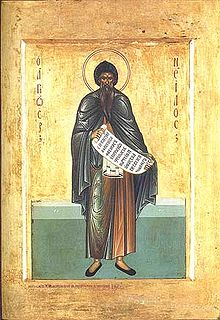Nilus of Sinai
Egyptian saint
Saint Nilus the Elder, of Sinai (also known as Neilos, Nilus of Sinai, Nilus of Ancyra; died November 12, 430) was a monk, theologian, Biblical scholar and ascetic writer.

Quotes
editAscetic Discourse (425 AD)
edit- in Philokalia, as translated and edited by G. E. H. Palmer, Philip Sherrard and Kallistos Ware (1979)
- The philosopher must be above all a free man, and not a slave of the passions.
- Philosophy is a state of moral integrity combined with a doctrine of true knowledge concerning reality.
- One was not rich while another was destitute, nor did one overeat while another starved. The generosity of those who were well off made good what others lacked, this willingness to share eliminating every anomaly and establishing equality and fairness - though even then inequality still existed, produced not as it is now by the mad struggle for social status, but by a great desire to live more humbly than others. Envy, malice, arrogance and haughtiness were banished, along with all that leads to discord.
- Why do we cling to money and possessions, and disperse our intellect among a host of useless cares? Our preoccupation with such things diverts us from what is more important and makes us neglect the well-being of the soul, leading us to perdition.
- By crouching a little we are able to spring upwards; and in the same way our faculty of discrimination, after stooping to attend to the needs of the body, can once more look upwards unimpeded, separating itself from all worldly thoughts.
- Men ... have been given legs that bend: in this way they can descend sometimes to fulfill the needs of the body, and at other times ascend to fulfill those of the soul.
- We should turn our attention to material things only in so far as some necessity forces us to do so. But always to be creeping on the ground in search of pleasure is defiling and degrading for someone with experience of spiritual knowledge.
- When bodily concerns predominate, everything in man is asleep: the intellect, the soul and the senses.
- Improbable details are often included in a story because of the deeper truth they signify.
- Who, when asked, will refuse to give what is needful to one who lives a holy life?
- How was Moses able to withstand Pharaoh when he had nothing but holiness to give him courage (cf. Exod. 5)? ... A solitary prophet once censured a king for his unlawful acts, when the king had his whole army with him. ... These holy men achieved such things because they had resolved to live for the soul alone, turning away from the body and its wants. The fact of needing nothing made them superior to all men. They chose to forsake the body and to free themselves from life in the flesh, rather than to betray the cause of holiness and, because of their bodily needs, to flatter the wealthy.
- But, as for us, when we lack something, instead of struggling courageously against our difficulties, we come fawning to the rich, like puppies wagging their tails in the hope of being tossed a bare bone or some crumbs. To get what we want, we call them benefactors and protectors of Christians, attributing every virtue to them, even though they may be utterly wicked.
- We should not flatter, because of our needs, those who value highly the very things it is our vocation to despise.